(完整版)小升初英语总复习----四种时态专项训练(精编)
- 格式:doc
- 大小:53.52 KB
- 文档页数:6
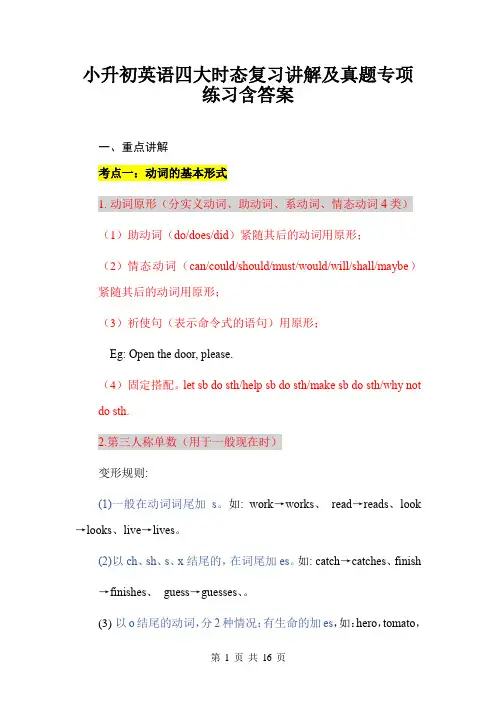
小升初英语四大时态复习讲解及真题专项练习含答案一、重点讲解考点一:动词的基本形式1.动词原形(分实义动词、助动词、系动词、情态动词4类)(1)助动词(do/does/did)紧随其后的动词用原形;(2)情态动词(can/could/should/must/would/will/shall/maybe)紧随其后的动词用原形;(3)祈使句(表示命令式的语句)用原形;Eg: Open the door, please.(4)固定搭配。
let sb do sth/help sb do sth/make sb do sth/why not do sth.2.第三人称单数(用于一般现在时)变形规则:(1)一般在动词词尾加s。
如: work→works、read→reads、look →looks、live→lives。
(2)以ch、sh、s、x结尾的,在词尾加es。
如: catch→catches、finish→finishes、guess→guesses、。
(3)以o结尾的动词,分2种情况:有生命的加es,如:hero,tomato,potato;没有生命的加s,如:radio,photo。
(4)以辅音字母加y结尾的动词,变y为ies。
如: fly→flies、study →studies、carry→carries.(5) 不规则变化。
如: have→has ,are→is,were→was3.现在分词(用于现在进行时)变形规则:(1)一般在动词后加ing。
如: work→working、read→reading、look →looking、wait→waiting。
(2)以不发音的e结尾的动词,去掉e,再加ing。
如: smile→smiling、move→moving、take→taking、write→writing。
(3)以重读闭音节结尾的且词尾只有一个辅音字母的,双写这个辅音字母加ing。
如: sit→sitting、stop→stopping、cut→cutting、run →running、swim→swimming.(4)少数几个以ie结尾的动词,将ie改为y加ing。

小升初英语时态综合总复习训练题附参考答案及解析一、单选题(共 27 小题)1、The Whites _____________ many places of interest since they came to China.A、have visitedB、will visitC、visitedD、visit2、— Is that Jack speaking?— Sorry, he isn't in right now. He _ the cinema with his aunt.A、has been toB、has gone toC、have been toD、have gone to3、— How many friends ______________you got?— Four.A、doB、willC、areD、have4、--What if you don't finish your work on time? -- Mrs. Brown will be very angry.A、happensB、is happenedC、happenedD、will happen5、Some people were _________ the river in a boat.A、 crossedB、 crossingC、 crosingD、 crosses6、He ________ cereal for breakfast yesterday.( )A、haveB、ateC、makes7、I _____ my hat yesterday.( )A、forgetB、forgotC、to forget8、Long ago, a little baby ____ born. ( )A、wereB、wasC、is9、Yesterday we ____ a lot of Christmas gifts.( )A、buyB、boughtC、buying10、A woman ________ to the store and ________ a dress.( )A、went; buyB、goes; buyC、went; boughtD、go; buy11、Jenny ____ cereal for breakfast yesterday. ( )A、ateB、eatC、eating12、Santa ____ them gifts yesterday. ( )B、broughtC、to bring13、He ____ people to love each other. ( )A、taughtB、teachC、teaching14、Yesterday we ____ gifts,( )A、boughtB、buyC、to buy15、I _______ home to China next week.A、flyB、will flyC、fly toD、fly for16、I ______________ go to the market (市场) to buy some fruit. ( )A、amB、isD、will17、I ____ 12 years old next year.( )A、amB、will beC、wasD、is18、Uncle Li ____ learn English next year.( )A、isB、going toC、is goD、is going to19、What are you going to _____________next week? ( )A、doB、didC、doesD、doing20、Jenny ____ cereal for breakfast yesterday.( )A、eatB、ateC、eats21、Kim ____ her father wash the dishes.( )A、helpB、helpsC、help to22、She ____ to learn English. ( )A、wantB、wantesC、wants23、It ____ her name on it!( )A、hasB、haveC、haven't24、They are ____ the newspaper.( )A、readB、to readC、reading25、She is _____ home now.A、going toB、go toC、going26、Mum is _____ eggs.A、cookB、cookingC、to cook27、Are they _____ cards? ( )A、playsB、playingC、played二、填空题(共 3 小题)1、用所给单词的适当形式填空。
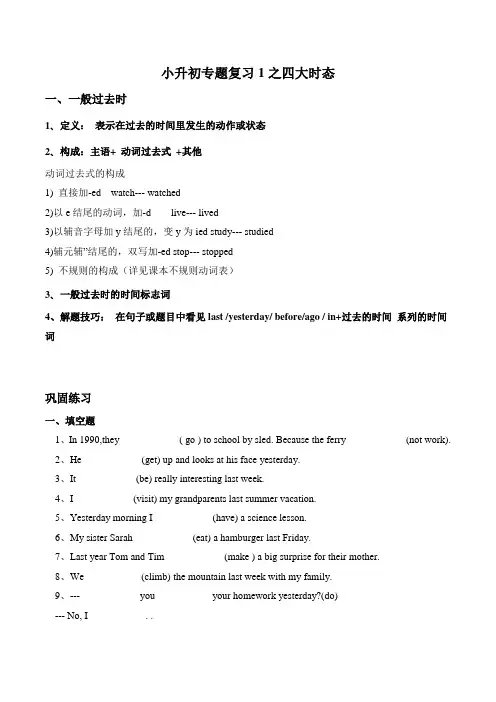
小升初专题复习1之四大时态一、一般过去时1、定义:表示在过去的时间里发生的动作或状态2、构成:主语+ 动词过去式+其他动词过去式的构成1) 直接加-ed watch--- watched2)以e结尾的动词,加-d live--- lived3)以辅音字母加y结尾的,变y为ied study--- studied4)辅元辅”结尾的,双写加-ed stop--- stopped5) 不规则的构成(详见课本不规则动词表)3、一般过去时的时间标志词4、解题技巧:在句子或题目中看见last /yesterday/ before/ago / in+过去的时间系列的时间词巩固练习一、填空题1、In 1990,they ___________ ( go ) to school by sled. Because the ferry ___________ (not work).2、He ___________ (get) up and looks at his face yesterday.3、It ___________ (be) really interesting last week.4、I ___________ (visit) my grandparents last summer vacation.5、Yesterday morning I ___________ (have) a science lesson.6、My sister Sarah ___________ (eat) a hamburger last Friday.7、Last year Tom and Tim ___________ (make ) a big surprise for their mother.8、We ___________(climb) the mountain last week with my family.9、--- ___________ you ___________your homework yesterday?(do)--- No, I ___________. .10、There ___________ (be) lots of flowers in my old school five years ago.答案went,didn’t work;got;was;visited ;had ;ate;made ;climbed;Did ,do ,didn’t ;were二、按要求完成句子1、He went for a picnic with his family yesterday afternoon.(改成否定句)______________________________________________________________________2、Mike lived in Beijing ten years ago.(对划线部分提问)______________________________________________________________________3、My little brother sang and danced in the party last Sunday.(对划线部分提问)______________________________________________________________________4、The girl could ride a bike before.对划线部分提问)______________________________________________________________________5、Sam worked in a big company last year.(改成一般疑问句)______________________________________________________________________答案1.He didn’t go for a picnic with his family yesterday afternoon.2.Where did Mike live ten years ago?3.When did your little brother sing and dance in the party?4.What could the girl do before?5.Did Sam work in a big company last year?二、一般现在时1、定义:表示经常性或习惯性的动作或状态;表示自然现象或真理2、句子构成:主语+ 动词(三单)+其他动词第三人称单数的构成1)直接加-s eg:play--plays2)以s/x/ch/sh/o结尾的,加-es eg.:watch-watches3)辅音字母+y结尾,变y为ies eg:study- studies4)特殊变化eg:have-- has3、一般现在时的时间标志词4.解题技巧:在句子中看见every/频率副词/on+星期系列,动词随主语的单复数变化而变化。
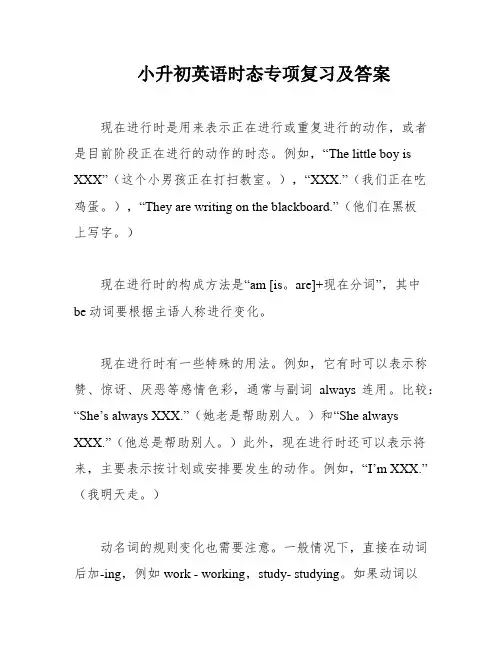
小升初英语时态专项复习及答案现在进行时是用来表示正在进行或重复进行的动作,或者是目前阶段正在进行的动作的时态。
例如,“The little boy is XXX”(这个小男孩正在打扫教室。
),“XXX.”(我们正在吃鸡蛋。
),“They are writing on the blackboard.”(他们在黑板上写字。
)现在进行时的构成方法是“am [is。
are]+现在分词”,其中be动词要根据主语人称进行变化。
现在进行时有一些特殊的用法。
例如,它有时可以表示称赞、惊讶、厌恶等感情色彩,通常与副词always连用。
比较:“She’s always XXX.”(她老是帮助别人。
)和“She always XXX.”(他总是帮助别人。
)此外,现在进行时还可以表示将来,主要表示按计划或安排要发生的动作。
例如,“I’m XXX.”(我明天走。
)动名词的规则变化也需要注意。
一般情况下,直接在动词后加-ing,例如work - working,study- studying。
如果动词以不发音的-e结尾,要去-e加-ing,例如take- taking,make-making。
对于重读闭音节的动词,若末尾只有一个辅音字母,要双写辅音字母,再加-ing,例如cut - cutting,put -putting。
以-ie结尾的动词要把变成y再加-ing,例如lie-lying,die - dying。
现在进行时的真题再现包括“Look!XXX XXX.”(瞧,孩子们正在踢足球。
)和“Look。
XXX XXX down from the tree.”(瞧,小熊猫正在从树上下来。
)1.XXX is XXX.2.I am watching TV right now.3.She is working in a hospital.4.Kitty and Ben are having XXX XXX.5.His father is able to help them.6."Danny。
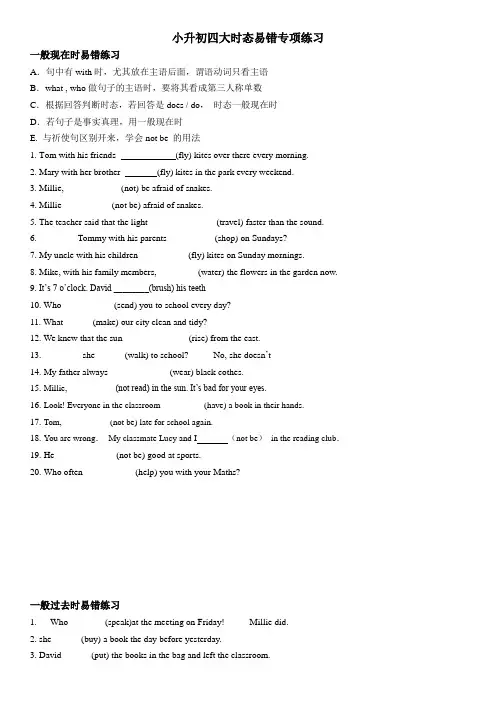
小升初四大时态易错专项练习一般现在时易错练习A.句中有with时,尤其放在主语后面,谓语动词只看主语B.what , who做句子的主语时,要将其看成第三人称单数C.根据回答判断时态,若回答是does / do,时态一般现在时D.若句子是事实真理,用一般现在时E. 与祈使句区别开来,学会not be 的用法1. Tom with his friends (fly) kites over there every morning.2. Mary with her brother (fly) kites in the park every weekend.3. Millie, ____________(not) be afraid of snakes.4. Millie___________(not be) afraid of snakes.5. The teacher said that the light _____________(travel) faster than the sound.6. ________ Tommy with his parents __________(shop) on Sundays?7. My uncle with his children___________(fly) kites on Sunday mornings.8. Mike, with his family members, ________ (water) the flowers in the garden now.9. It’s 7 o’clock. David ________(brush) his teeth10. Who ___________(send) you to school every day?11. What ______(make) our city clean and tidy?12. We knew that the sun ______________(rise) from the east.13. --- ______she ______(walk) to school? --- No, she doesn’t14. My father always _____________(wear) black cothes.15. Millie, __________ (not read) in the sun. It’s bad for your eyes.16. Look! Everyone in the classroom _________ (have) a book in their hands.17. Tom, __________ (not be) late for school again.18. You are wrong.My classmate Lucy and I(not be)in the reading club.19. He _____________(not be) good at sports.20. Who often ___________(help) you with your Maths?一般过去时易错练习1. --- Who _______ (speak)at the meeting on Friday! --- Millie did.2. she ______(buy) a book the day before yesterday.3. David ______(put) the books in the bag and left the classroom.4. She __________(think) that she was late for school.5. ______ Tom __________(ride) to school yesterday?6. Who _____________(teach) you English last year?7. My parents _____________(buy) me a new bike as my birthday present last week.8. Who ______________(teach) you to ride a bike when you were a child?9. Millie ________________(not do) homework yesterday.10. My father read a book in the room, and I _____________(do) my homework in the study.11. At last, I _______________(come) home at 10:00 P M.12. My father ______________(take) this photo in Japan about two years ago.13. Tom _______________(not write) a letter to his parents yesterday evening.14. My cousin ____________(put) up a tent near a lake 10 minutes ago.15. Lucy _____________(go) to the City Museum last Sunday.16. My friend, Carol, _________________(study) for the math test last night.17. She _________(stay) at home and ____________(do) some cleaning after she came back from work.18. She _______________ (not visit) her aunt last weekend.19. ________ she __________ (practice) her guitar yesterday?20. I _____________(have) an exciting party last weekend.一般将来时易错练习A. there be的一般将来时:there will be / there is are/ going to be;注意不能出现have一词B. in + 一段时间:in 3 hours; in 2 days等用将来时C. 根据回答来使用will或者be going toD. if 表达如果,主将从现1. My father ___________(go) to Shanghai next week, won’t he?2. She ______________(come) back to HK in 3 days.3. __________Lily _________ (play) with her friends tomorrow? No, she isn’t.4. _______there ________ (be) two football matches in two weeks, aren’t there?5. --Who________ (teach) you maths? ---- Mr Wang will.6. The members of Running Man_______________ (arrive)at the airport in half an hour.7. There ____________(be) a football match tomorrow.8. --- ________ there ________(be) a football match tomorrow? ---- Yes, there will.9. My father _____________(go) to Shanghai next week.10. __________ we meet at the school gate tomorrow?11. We’ll go to the park if it_____ rain tomorrow.A. don’tB. doesn’tC. won’tD. isn’t12. — If my uncle_______ next weekend, we_______ with him. — Sounds great!A. will come; will go skiingB. will come; goes skiingC. comes; will go skiingD. comes; goes ski13. —What will you do if it _______ tomorrow?14.—I will stay at home and watch the match on TV.A. rainB. rainsC. will rainD. is raining15. I’m sorry I’m very bus y now. If I ______ time, I ______ come to see you.A. have, wouldB. had, willC. were, willD. have, will16. James with the Greens _______ the White Tower Park if it_______ tomorrow.A. are go ing to; isn’t rainyB. are going to; does n’t rainC. is go ing to ; won’t rainD. is going to; isn’t rainy17. --- There ____________a bird show this afternoon. Shall we go to the zoo to watch it? --- Good idea.A. will haveB.is going to haveC. will beD. is going to18. --- Will there ________ a volleyball match on Sunday?--- Yes. There __________ two volleyball matches on that day.A. be; are going to beB. have; are going to beC. have; are going to haveD. be; are going to have19. There _________ a "helping ha nds” meeting this Sunday morning.A. is; atB. will be; atC.is going to be; /D. is going to have; on20. --- There _____________ a parents' meeting on Tuesday afternoon, isn't there?--- Yes. But my parents don't have time for it.A. will haveB. will beC. is going to haveD. is going to be现在进行时易错练习A. have作为有的意思来讲时,没有进行时。

小升初英语四大时态复习讲解及真题专项练习含答案一、重点讲解考点一:动词的基本形式1.动词原形(分实义动词、助动词、系动词、情态动词4类)(1)助动词(do/does/did)紧随其后的动词用原形;(2)情态动词(can/could/should/must/would/will/shall/maybe)紧随其后的动词用原形;(3)祈使句(表示命令式的语句)用原形;Eg: Open the door, please.(4)固定搭配。
let sb do sth/help sb do sth/make sb do sth/why not do sth.2.第三人称单数(用于一般现在时)变形规则:(1)一般在动词词尾加s。
如: work→works、read→reads、look →looks、live→lives。
(2)以ch、sh、s、x结尾的,在词尾加es。
如: catch→catches、finish→finishes、guess→guesses、。
(3)以o结尾的动词,分2种情况:有生命的加es,如:hero,tomato,potato;没有生命的加s,如:radio,photo。
(4)以辅音字母加y结尾的动词,变y为ies。
如: fly→flies、study →studies、carry→carries.(5) 不规则变化。
如: have→has ,are→is,were→was3.现在分词(用于现在进行时)变形规则:(1)一般在动词后加ing。
如: work→working、read→reading、look →looking、wait→waiting。
(2)以不发音的e结尾的动词,去掉e,再加ing。
如: smile→smiling、move→moving、take→taking、write→writing。
(3)以重读闭音节结尾的且词尾只有一个辅音字母的,双写这个辅音字母加ing。
如: sit→sitting、stop→stopping、cut→cutting、run →running、swim→swimming.(4)少数几个以ie结尾的动词,将ie改为y加ing。
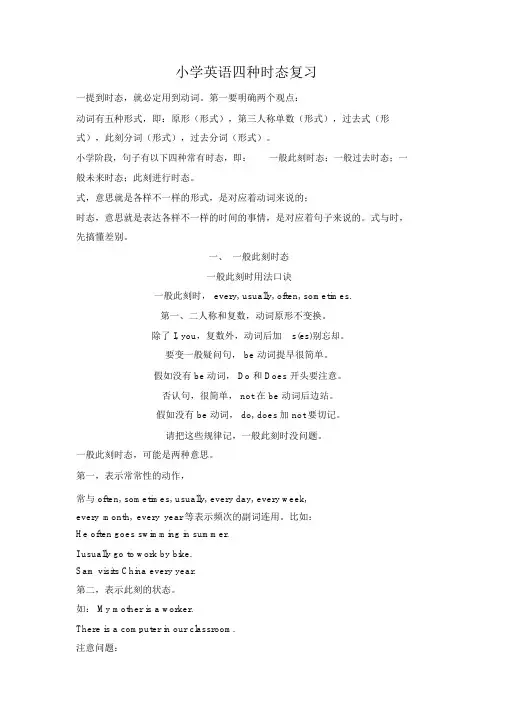
小学英语四种时态复习一提到时态,就必定用到动词。
第一要明确两个观点:动词有五种形式,即:原形(形式),第三人称单数(形式),过去式(形式),此刻分词(形式),过去分词(形式)。
小学阶段,句子有以下四种常有时态,即:一般此刻时态;一般过去时态;一般未来时态;此刻进行时态。
式,意思就是各样不一样的形式,是对应着动词来说的;时态,意思就是表达各样不一样的时间的事情,是对应着句子来说的。
式与时,先搞懂差别。
一、一般此刻时态一般此刻时用法口诀一般此刻时, every, usually, often, sometimes.第一、二人称和复数,动词原形不变换。
除了 I, you,复数外,动词后加s(es)别忘却。
要变一般疑问句, be 动词提早很简单。
假如没有 be动词, Do 和 Does 开头要注意。
否认句,很简单, not 在 be 动词后边站。
假如没有 be 动词, do, does加 not 要切记。
请把这些规律记,一般此刻时没问题。
一般此刻时态,可能是两种意思。
第一,表示常常性的动作,常与 often, sometimes, usually, every day, every week,every month, every year等表示频次的副词连用。
比如:He often goes swimming in summer.I usually go to work by bike.Sam visits China every year.第二,表示此刻的状态。
如: My mother is a worker.There is a computer in our classroom.注意问题:be (am, is, are)动词就是独立的谓语动词,一个句子中有了be(am, is, are)就有了谓语动词了。
句子中不可以同时出现两个谓语动词。
许多同学常常出这样的错误:The boy is often eats hamburgers(.错)应改为: The boy often eats hamburgers.二、此刻进行时态正在进行时态口诀此刻分词用途多,进行时态不用说。
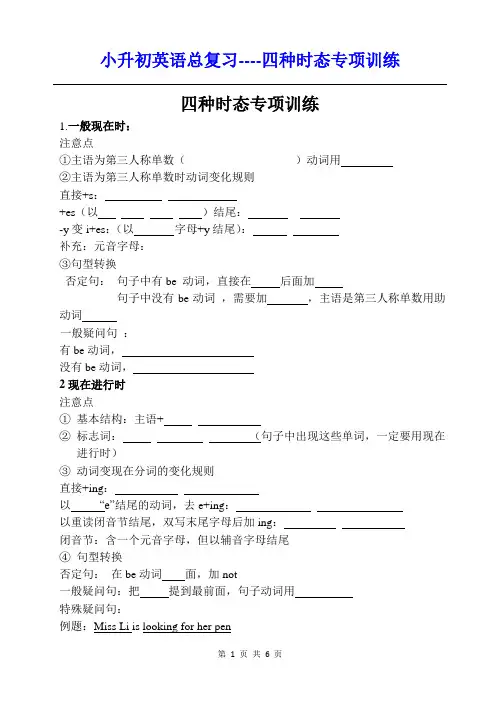
四种时态专项训练1.一般现在时:注意点①主语为第三人称单数()动词用②主语为第三人称单数时动词变化规则直接+s:+es(以)结尾:-y变i+es:(以字母+y结尾):补充:元音字母:③句型转换否定句:句子中有be 动词,直接在后面加句子中没有be动词,需要加,主语是第三人称单数用助动词一般疑问句:有be动词,没有be动词,2现在进行时注意点①基本结构:主语+②标志词:(句子中出现这些单词,一定要用现在进行时)③动词变现在分词的变化规则直接+ing:以“e”结尾的动词,去e+ing:以重读闭音节结尾,双写末尾字母后加ing:闭音节:含一个元音字母,但以辅音字母结尾④句型转换否定句:在be动词面,加not一般疑问句:把提到最前面,句子动词用特殊疑问句:例题:Miss Li is looking for her pen①②对①进行提问:对②进行提问:3一般过去时:注意点④句型转换否定句:主语+ (没有be动词)主语+ (有be动词)一般疑问句:以开头(没有be动词)以开头(有be动词)特殊疑问句:特殊疑问词+ + + ?(没有be动词)例题翻译:你家过去在哪里?4,一般将来时注意点①基本结构:主语+②标志词:next+年,月,日③句型转换:否定句:在be动词面加not他下周打算去公园吗?(一般疑问句)他下周打算去哪里?(特殊疑问句)④翻译:下周它将会是:_________ did you ________ the birds?2. Then, he let the boy go.(改为否定句)Then,he _______ ________ the boy go.3. They could play football.(改为一般疑问句,并作肯定回答)----________ they play football? ----Yes, they _________.4. Nancy lives in Nanjing now.(用last year 改写句子)Nancy _______ in Nanjing last year.5.I went to a shopping centre last Sunday.(改为一般疑问句,并作否定回答)---______ you ______ to a shopping centre last Sunday? ---No, I _________.6. He puts his things in order. (改为一般疑问句)___________________________________________________7. Did you go to bed late last night? (改为陈述句)____________________________________________________8. They often do their homework in the evening. (用she替换they)____________________________________________________9. You should put your books and toys on the floor. (改为否定句)_____________________________________________________10. He feels sleepy in the morning. (对划线部分提问)____________________________________________________11. This is Bobby’s bedroom. (对划线部分提问)____________________________________________________12. have, my, time, breakfast, I, always, on (.) (连词成句)____________________________________________________.13. The, out, the, get, lion, mouse, helped (.) (连词成句)____________________________________________________. 14. A monkey woke the tiger up.(改成一般疑问句)__________________________________________________15. Sam brings some water.(改成否定句)__________________________________________________16. Mike has some bread and milk for breakfast. (对划线部分提问)__________________________________________________17. The man sings well. (对划线部分提问)18. too, you, cola, much, drink, shouldn’t (.) (连词成句)______________________________________________________20 The children must play football on the road.(改为否定句)______________________________________________________ 21. We must look out for the traffic lights first.(对划线部分提问)______________________________________________________ 22. An old woman is crossing the road.(对划线部分提问)______________________________________________________ 23. You can’t watch TV now because it’s late. (对划线部分提问)______________________________________________________ 24. keep, desk, tidy, I, must, my, clean, and (.)(连词成句)______________________________________________________二用所给词的适当形式填空1.Let (we )(play) basketball this afternoon.2. (Be)your sister (visit) your parents tomorrow?3.Yang Ling is going to (make) clothes for her dolls.4. (child) Day is on the first of June.5. Tim usually (brush) his teeth in the morning.6.I (have) a birthday party last year.7.Tomorrow is Dragon Boat Festival. We (watch )a dragon boat race.8. They (eat) moon cakes last Mid-Autumn Festival?9.My parents ( watch) TV in the living room now.10. Your birthdayis coming. I (make) a cake for you.11.Let’s(play) the piano together.12.How many ( visit) are there in your group?13.My sister wants ( learn) about in England.14.My uncle is from ( Chinese).15.Animal ( love) will go to see them quickly.16.Jack (go )and look for his parents next week.17. (visit) from the US are very friendly.18.The girls ( learn) an English song next week.19.The students are very (excite).Because the game is very (e xcite).20.My mother likes ( listen)to music after dinner.21.He ( read) a book last night.22.Lucy is going to ( find) a book about e- cards.23.I (eat) some bread for breakfast yesterday.24.Can I ( have) an English book?25.We (are) twelve years old last year.26.I want (buy )a computer.27.What ( be) your parents going to do this weekend?28.We (fly) kites tomorrow.29.The boy ( come) to my house the day after tomorrow.30.What about (go )for a picnic next week?31. Mary’s birthday is next Monday, her mother (give) her a present.32.My mother ( buy) some snacks and drinks this morning.33. (Be) your family going to climb the hill next Sunday?34.Now, Bobby ( wear) his new clothes.35.This lesson (end) at half past eleven. Then you can have lunch.35. It is very cold these days . It (snow) tomorrow.36.-- You ( come here again next Saturday?---No. I (visit) my teacher.37.Hurry up! or we (be )late.38.--What you ( do) tomorrow afternoon?--I (see )a film with my friend.39.---Can you come and ( help )me with my English ,mum?。
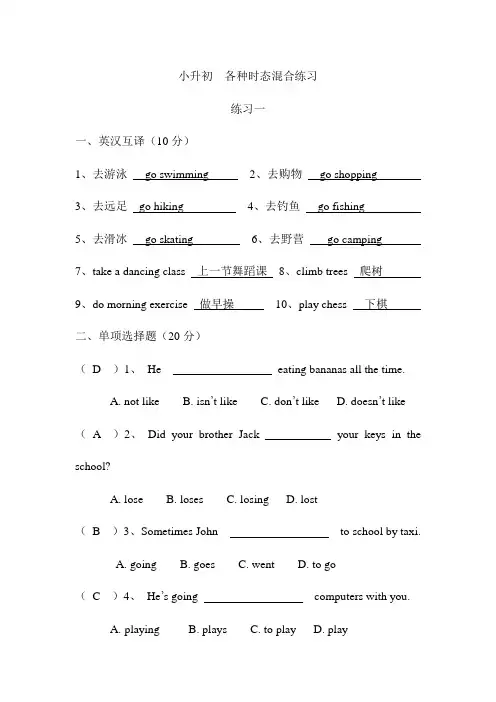
小升初各种时态混合练习练习一一、英汉互译(10分)1、去游泳go swimming2、去购物go shopping3、去远足go hiking4、去钓鱼go fishing5、去滑冰go skating6、去野营go camping7、take a dancing class 上一节舞蹈课8、climb trees 爬树9、do morning exercise 做早操10、play chess 下棋二、单项选择题(20分)(D )1、He eating bananas all the time.A. not likeB. isn’t likeC. don’t likeD. doesn’t like ( A )2、Did your brother Jack your keys in the school?A. loseB. losesC. losingD. lost(B )3、Sometimes John to school by taxi.A. goingB. goesC. wentD. to go(C )4、He’s going computers with you.A.playingB. playsC. to playD. play(C )5、What will the kid buy in the shop?A. wantB. wantsC. want toD. wants to(A )6、Samuel usually football with the players .A. playsB. playingC. to playD. play( C )7、The student up at six o’clock every morning.A. getB. gettingC. getsD. to get( B )8、The leaves on the ground a little green.A. lookB. looksC. lookingD. to look(C )9、Everyone in the school a school uniform when he or she is in school.A. wearB. wearingC. wearsD. to wear(D )10、There isn’t kites in the sky.A. someB. otherC. bothD. any三、选出不同类的一项(5分)(B )1、A. draw B. pictures C. make D. buy( B )2、A. spell B. color C. keep D. count(C )3、A. took B. could C. hurt D. went(D )4、A. touch B. open C. guess D. with( A )5、A. subway B. take C. pay D. fly四、用be动词的正确形式填空(20分)1、Here are some beautiful flowers and a bee.2、---What are these over there?---They are caps.3、The sweater was very warm last year.4、There was some water on the desk yesterday.5、There is a desk and three chairs in the room.6、Jimmy and I were going to see a film last weekend.7、The eggs in the table are mine.8、Is there anything else?9、The weather is cold in winter.10、What was your hobbies before?五、用所给词的适当形式填空(10分)1、It sounds great.(sound)2、How does your aunt feel now?(feel)3、Our GPS didn’t work .(work)4、Let’s get together on National Day.(get)5、Bill drank some tea with his grandpa three days ago.(drink)六、根据提示补全句子(5分)1、Look! Our cat is chasing a mouse now.(正在追)2、He wants to buy a new word book after school.(想要)3、Last Friday, Jack could sing an English song.(能)4、We’re going to clean our classroom together.(打算打扫)5、How did your father go to the zoo with you?(去动物园)七、按要求完成句子(20分)1、He likes watching cartoons shows.(改为否定句)He doesn’t like watching cartoons shows.2、My uncle lives on a farm.(改为一般疑问句并作否定回答)Does your uncle live on a farm?No, he doesn’t.3、I’m going to take a trip next vacation.(对划线部分提问)What are you going to do next vacation?4、The boy likes summer best.(对划线部分提问)Which season does the boy like best?5、Jack usually talks to his classmates in class.(对划线部分提问)Who does Jack usually talk to in class?八、改错(10分)1、My sister sees a movie now.sees 改为is seeing2、He’s going to has a lesson about music tomorrow.has 改为having3、Now Sam are having a maths class.are 改为is4、Where does your uncle works?works 改为work5、He can play the guitar three years ago.can 改为could小升初各种时态混合练习练习二一、英汉互译(10分)1、听音乐listen to music2、堆雪人make a snowman\make snowmen3、放风筝fly kites\fly a kite4、去上学go to school5、turn left at 在...左转6、write an email 写一封邮件7、read stories books 读故事书8、have breakfast 吃早餐9、learn Chinese 学习语文、汉语10、use the computer 使用电脑二、单项选择题(20分)( C )1、A friend of mine hiking very much.A. likesB. like goingC. likes goingD. likes goes ( D )2、There is going to a singing game next weekend.A. isB. amC. areD. be( C )3、Jimmy usually to the libraryA. walkingB. walkedC. walksD. walk(D )4、Look! The birds in the sky.A. fliesB. flyingC. is flyingD. are flying( A )5、Did you anything for yourself?A. buyB. boughtC. broughtD. thought( C )6、Would you like some water?A. drinkB. drinksC. to drinkD. drank( D )7、Yesterday a sunny day. But today rainy this morning.A. is, wasB. are, isC. is, areD. was, is(B )8、My uncle running every day.A. keepB. keepsC. keptD. keeping(D )9、Mike to the new zoo on the Dongfang Street last Friday.A. goesB. to goC. goD. went(B )10、Maybe Lily is his daughter Chinese.A. teachesB. teachingC. to teachingD. teach三、选出不同类的一项(10分)(B )1、A. get B. right C. put D. turn( C )2、A. visit B. play C. sports D. listen(C )3、A. sing B. study C. song D. wash( D )4、A. wear B. have C. write D. clothes( B )5、A. home B. leave C. fall D. autumn四、用助动词的正确形式填空(10分)1、What does the boy usually do on the weekend?2、Did you finish your homework yesterday?3、I don’t like maths. Jack doesn’t like studying maths, either.4、What does your sister do ?5、What did Sarah’s father do last summer vacation.五、用所给词的适当形式填空(10分)1、---What does your brother do on the weekend?---He plays soccer on the playground in school.(play)2、Look! The fat panda is eating (eat) bamboos.3、Jackie is going to buy (buy) a new dictionary because his old dictionary is broken.(be)4、My parents often go to work by bus, but my brother Sam usually goes to work by taxi.(go)5、Jack will visit (visit) his grandparents if he comes back home.六、根据提示补全句子(10分)1、Bill did (his) homework at home all day last Sunday.(做作业)2、My sister studies Chinese (学习中文)every night at a training school.3、Look! There is a boy playing basketball (打篮球)in the street.4、Slow down and stop at a yellow light.(减速)5、How did you get to the countryside last vacation.(到达)七、按要求完成句子(20分)1、There was some old schools five years ago.(改为否定句)There wasn’t any old schools five years ago.2、Nancy is going to visit her grandparents this weekend.(用every weekend 改写句子)Nancy visits her grandparents every weekend.3、My father felt very angry just now.(对划线部分提问)How does your father feel now?4、He like watching TV and drawing cartoons.(对划线部分提问)What are his hobbies?5、My mother came to the street two days ago.(对划线部分提问)When did your mother come to the street.八、改错(10分)1、Mickey will come and joins us.joins 改为join2、He don’t like singing and dancing at all.don’t 改为doesn’t3、Look! Sam and Bill is seeing a film.is 改为are4、My mother cooks dinner for us yesterday evening.Cooks\yesterday 改为cooked \every5、There aren’t any trees in the desert one year ago.aren’t 改为weren’t小升初各种时态混合练习练习三一、英汉互译(10分)1、count to nine 数到九2、go to bed 上床睡觉3、回家go home4、在家at home5、起床get up6、醒来wake up7、do housework 做作业8、try on 试穿9、drink milk 喝牛奶10、eat dinner 吃晚饭二、单项选择题(20分)(A )1、It Sunday today, and it Saturday yesterday.A.is,wasB. was, isC. is,isD. was, was(D )2、He be a police officer one day.A. want toB. wantsC. wantD. wants to( C )3、Can you also Peter’s pen pal?A. areB. isC. beD. am(A )4、We often together every Sunday evening.A. getB. getsC. gettingD. got(C )5、The teacher that we students should study hard when she was in the school.A. sayB. saysC. saidD. saying( A )6、Both Tom and Sarah will many pictures in the zoo next week.A. takeB. takesC. takingD. took( B )7、Mandy in Shanghai last year.A.studiesB. studiedC. studyingD. to study( C )8、Amy her schoolbag now.A. washesB. washingC. is washingD. washes( C )9、The child always his homework on the weekday.A.not doesB. didn’t doC. doesn’t doD. don’t does ( D )10、Don’t angry with the bad mouse.A. isB. amC. areD. be三、选出不同类的一项(10分)(C )1、A. sounds B. likes C. looking D. has(A )2、A. hello B. happy C.worried D. exciting(B )3、A. idea B. good C. club D. subject (A )4、A. homework B. does C. make D. take (D )5、A. need B. must C. come D. from四、用所给词的适当形式填空(10分)1、He runs faster than me.(run)2、What will the student want to buy in the supermarket?(buy)3、Fall is coming (come) . The leaves turns yellow.(turn)4、Mike usually gets up late in the morning.(get)5、Peter doesn’t read (not read) books in his free time.五、根据提示补全句子(10分)1、My cousin Billy is\comes from (来自)America.2、Last night Sam stayed at (待在家)with my family.3、I made a snowman with my best friend Fakie and Mike last year.(堆雪人)4、The girl doesn’t like (不喜欢) playing ping-pong.5、We’re going to take\have (打算上....课)an art class tomorrow.六、根据括号里的所给的时间提示词改写句子(20分)1、He often goes swimming with his coach.(now)He is swimming with his coach now.2、Peter will have a piano lesson next week.(last weekend)Peter had a piano class last weekend.3、My friend is going to take a trip this summer holiday.(every summer holiday)Mike takes a trip every summer holiday.4、I sometimes go for a picnic with my family.(tomorrow morning)I’m going to go for a picnic with my family tomorrow morning.或I will go for a picnic with my family tomorrow morning.5、There is some water on the ground.(ten minutes ago)There was some water on the ground ten minutes ago.七、改错(10分)1、Look! The NO. 6 bus is comes.comes 改为coming2、The boy reads the newspaper just now.reads 改为read3、Peter often washs his clothes on the weekend.washs 改为washes4、How many classes did he have on Fridays?did 改为does5、I want to buy a word book before.want 改为wanted八、作文(10分)以My Best Friend为题,写一篇不少于50词的作文。
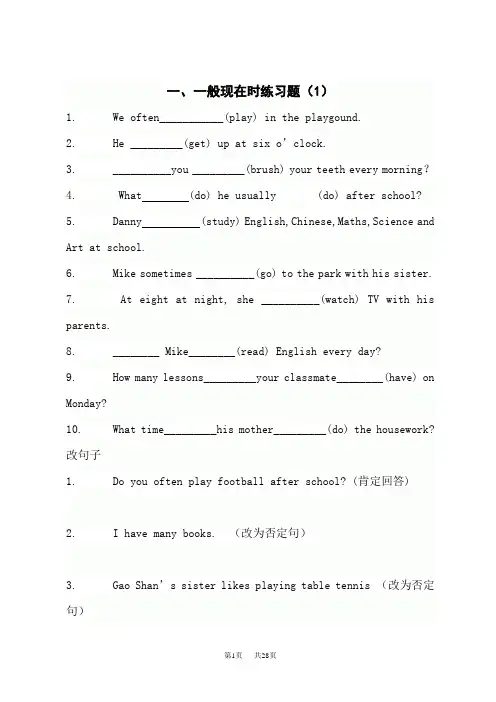
一、一般现在时练习题(1)1. We often___________(play) in the playgound.2. He _________(get) up at six o’clock.3. __________you _________(brush) your teeth every morning?4. What (do) he usually (do) after school?5. Danny (study) English,Chinese,Maths,Science and Art at school.6. Mike sometimes __________(go) to the park with his sister.7. At eight at night, she __________(watch) TV with his parents.8. ________ Mike________(read) English every day?9. How many lessons_________your classmate________(have) on Monday?10. What time_________his mother_________(do) the housework? 改句子1. Do you often play football after school? (肯定回答)2. I have many books. (改为否定句)3. Gao Sha n’s sister likes playing table tennis (改为否定句)4. She lives in a small town near New York. (改为一般疑问句)5. I watch TV every day. (改为一般疑问句)6. David has a goal. (改为一般疑问句)7. We have four lessons.(否定句)8. Nancy doesn’t run fast (肯定句)9. My dog runs fast.否定句:一般疑问句:10. Mike has two letters for him.一般疑问句:否定句:11. I usually play football on Friday afternoon.一般疑问句:否定句:一般现在时练习(2)1. He often (have) dinner at home.2. Daniel and Tommy (be) in Class One.3. We (not watch) TV on Monday.4. Nick (not go) to the zoo on Sunday.5. they (like) the World Cup?6. What they often (do) on Saturdays?7. your parents (read) newspapers every day?8. The girl (teach) us English on Sundays.9. She and I (take) a walk together every evening.10. There (be) some water in the bottle.二、现在进行时练习1、I _______________________( look for) a shirt, I’m looking fora tie.2、They ______________________( plant) flowers in the yard now.3、Miss Baker _________________( drink) milk in the cafeteria now.4、What are you _________(do) now? I ___________(eat) bread.5、It’s nine o’clock. My father_______________(work) in the office.6、Look, the boy____________(put) the rubbish into the bin.7、__________he__________(clean) the classroom? No, he isn’t. He____________(play).8、Where is Mak? He___________(run) on the grass.9、Listen, who____________(sing) in the music room? Oh, Mary_____________(sing) there.10、Who_______(sing)a song? ----Li Ying is.现在进行时练习(2)1、写出下例动词的现在分词形式1)give____ 2)use____ 3)clean____ 4)skate____ 5)draw____ 6)tell____ 7)do____ 8)write____ 9)get____ 10)put____ 11)take____ 12)stop____ 13)speak____ 14)swim____ 15)come____ 16)lie____ 17)die____ 18)cook____ 19)fly____ 20)help____ 21)close____ 22)see____ 23)run____2、用现在进行时连写句子1)Li Ping;learn;to;speak;English;____________________________________________________________it;rain;now____________________________________________________________3)they;watch;a football match;on TV____________________________________________________________he;look;out of the window;____________________________________________________________look;the dog;sleep;____________________________________________________________listen;the boy;talk;____________________________________________________________ they;have lunch;at seven o'clock____________________________________________________________ the students;write;homework;now;____________________________________________________________ 3、将下例句子改成一般疑问句1)Mike is climbing the hill。
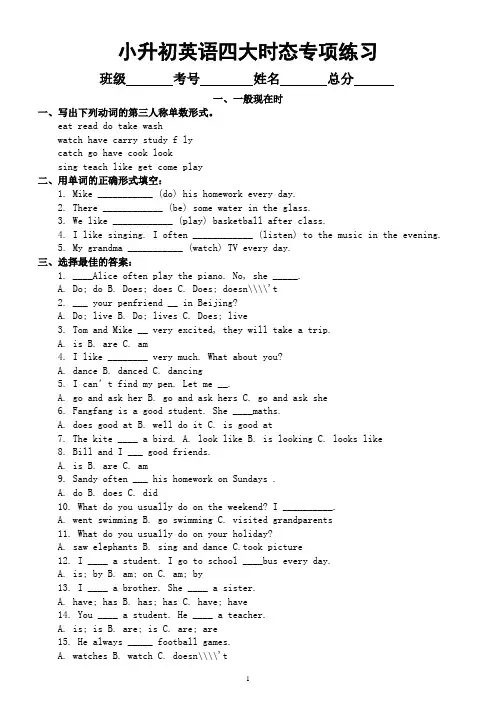
小升初英语四大时态专项练习班级考号姓名总分一、一般现在时一、写出下列动词的第三人称单数形式。
eat read do take washwatch have carry study f lycatch go have cook looksing teach like get come play二、用单词的正确形式填空:1. Mike ___________ (do) his homework every day.2. There ____________ (be) some water in the glass.3. We like ____________ (play) basketball after class.4. I like singing. I often ____________ (listen) to the music in the evening.5. My grandma ___________ (watch) TV every day.三、选择最佳的答案:1. ____Alice often play the piano. No, she _____.A. Do; doB. Does; doesC. Does; doesn\\\\'t2. ___ your penfriend __ in Beijing?A. Do; liveB. Do; livesC. Does; live3. Tom and Mike __ very excited, they will take a trip.A. isB. areC. am4. I like ________ very much. What about you?A. danceB. dancedC. dancing5. I can’t find my pen. Let me __.A. go and ask herB. go and ask hersC. go and ask she6. Fangfang is a good student. She ____maths.A. does good atB. well do itC. is good at7. The kite ____ a bird. A. look like B. is looking C. looks like8. Bill and I ___ good friends.A. isB. areC. am9. Sandy often ___ his homework on Sundays .A. doB. doesC. did10. What do you usually do on the weekend? I __________.A. went swimmingB. go swimmingC. visited grandparents11. What do you usually do on your holiday?A. saw elephantsB. sing and danceC.took picture12. I ____ a student. I go to school ____bus every day.A. is; byB. am; onC. am; by13. I ____ a brother. She ____ a sister.A. have; hasB. has; hasC. have; have14. You ____ a student. He ____ a teacher.A. is; isB. are; isC. are; are15. He always _____ football games.A. watchesB. watchC. doesn\\\\'t16. My best friend _____ shells.A. collectsB. collectC. often17. She doesn’t _____ listening to the music.A. oftenB. likeC. likes18. My mother and I ___ always watch romantic films.A. doesn’tB. don’tC. do19. ---When _____ he get home on Friday?----He gets home at four on Friday.A. doB. doesC. did二、现在进行时一、写出下列单词的现在分词:do play dance sitmake swim jump cookclean watch come readeat write sing gorun fly catch help二、用单词的适当形式填空:1. look! Chen Jie and Mike are ___________(sing)now.2. The small bear is ________ (climb) the tree.3. Mike is ________ (draw) picture.4. She is ________ (do) the dishes.5. My brother is ________ (make) kites.6. My father is ________ (read) a newspaper in living room.7. Ted is __________(answer) the phone.8. My uncle is ________ (drive) a car.9. The students are ________(listen) to their teacher carefully.10. Chen Jie is _________(wash) clothes.三、选择正确答案1. Every one ____ to their teacher in the classroom.A. are listeningB. is listeningC. listen2. They are singing and ___ together at the party now.A. danceB. dancedC. dancing3. Listen! The birds ____.A. is singingB. are singC. are singing4. Look! The kite ___ in the sky. A. fly B. flies C. is flying5. They ____ riding a forse. A. is B. are C. am6. Kate ____ playing chess. A. am B. is C. are7. Are you washing clothes?A. Yes, you areB. Yes, I amC. No, I am8. Is he ____ TV?Yes, he is. A. watch B. watching C. not9. ____ they taking pictures.? Yes, they are.A. AmB. BeC. Are10. It’s 10 o’clock. Ben _____ TV in the bedroom.A. watchB. is watchingC. watches四、根据中文填空。
六年级英语小升初语法易错动词四大时态综合训练卷班级: 姓名: 得分:一、基础训练1.[基础]按要求写出下列单词的正确形式。
(1) is(过去式) (9) do(三单)(2) like(三单) (10) swim(现在分词)(3) study(过去式) (11) play(过去式)(4) see(现在分词) (12) can(过去式)(5) think(过去式) (13) go(过去式)(6) buy(过去式) (14) dish(三单)(7) wash(三单) (15) have(现在分词)(8) run(三单)2.[be动词]用be动词的正确形式填空。
(1)I from China, But my friends, Lily and Lucy, from America.(2) It sunny today, but it was rainy yesterday. Tomorrow, it will snowy(3) My parents young twenty years ago. Now, they old. But I love them.(4)I active now. But three years ago, I very shy.(5)I want to a teacher, because my parents both teachers.(6)—— Jack from Beijing? ——No, he3.[助动词、情态动词]用do或will 的正确形式填空。
(1) What your brother do at weekends?——He plays basketball with his friends.(2) What you do last Sunday? ——I visited the Great Wall(3) When you go to London? ——Tomorrow morning.(4) you your homework yesterday? ——Yes, I(5) you go to the cinema with me next Sunday?——No, I4.[应用]用所给词的适当形式填空。
完整版)小学四大时态的综合练习基础知识概念结构、时间状语、否定和一般疑问句在英语语法中,有一些基础知识是必须掌握的,包括概念结构、时间状语、否定和一般疑问句等。
其中,概念结构是指一个句子中的各个成分之间的关系;时间状语则是表示时间的词语,如ago、yesterday、the day before yesterday、last week 等;否定形式包括主语+am/is/are+not以及主语+don't/doesn't+动词原形等;一般疑问句则是以am/is/are或do/does开头的问句,如Am/Is/Are+主语+。
或Do/Does+主语+。
表示过去某个时间在表示过去某个时间的时候,我们可以使用was/were来表示过去发生的动作或者状态,也可以使用had来表示过去的惯性动作或状态。
例如,我们可以说yesterday I was very busy,表示昨天我非常忙碌;又如,when I was young。
I had a lot of friends,表示在我年轻的时候,我有很多朋友。
表示经常、反复发生的动作或行为如果我们想要表达经常、反复发生的动作或行为,可以使用is/am/are+动词原形/动词的第三人称单数形式,或者使用often、usually、always、never、sometimes、every week、oncea week、on Sundays等时间状语。
例如,I usually go to bed at11 o'clock,表示我通常在11点钟睡觉;又如,she is always late for class,表示她上课总是迟到。
表示现况和性质在表示现况和性质的时候,我们可以使用have/has+动词原形+一段时间(如week/year/month/night)、in 1989、just now、at the age of twelve、one day、long long ago等时间状语。
英语四大时态总复习一般现在时一、一般现在时的形式以及定义二、一般现在时的基本用法1. 表示事物的性质、特征以及经常性的行为,常与always, often, usually, every day等词连用。
Tom usually comes to school late. Tom 经常上学迟到。
2. 表示客观事实和普遍真理。
The sun rises in the east. 太阳从东方升起。
3. 用在格言、谚语中。
No pains, no gains.不劳而获。
一般过去时一、一般过去时的定义以及形式二、一般过去时的基本用法1. 表示在过去的时间里发生的动作或存在的状态,常与yesterday, last night, several years ago等连用。
I took a bus to school last Friday.上周五我坐公交车去上学。
2. 表示在过去的某段时间里,经常或反复发生的动作或状态。
They had a walk after supper last year. 他们去年经常晚饭后散步。
一般将来时一、一般将来时的定语以及形式二、一般将来时的基本用法1. 表示将来某个时间要发生的动作或状态,常与将来的时间状语tomorrow, next week等连用。
She will be back tomorrow.她明天就回来。
2. 表示将来某一时间内经常发生的动作或状态。
We’ll have a test every Monday this year. 今年的每一个周一我们都有考试。
巧学妙计Be going to 指当前已计划过或思考过的意图和打算;will/ shall 表示未事先思考或未计划的意图。
Be going to 还可以表明马上要发生,而will则表明说话者的观点、主观意识。
I’m going to visit mu aunt this week. 我打算这周去看望姑姑。
小升初四种时态习题精编版一般过去时用法:①过去发生的动作;②过去存在的状态。
一般过去时中,动词过去式的构成规则1. 一般情况下,直接加ed。
如:visit---visited2. 以不发音的e结尾,加d。
如:live---lived3. 以辅音字母+y结尾,把y改成i,加ed。
如:study---studied4. 以元音字母+y结尾,直接加ed。
如:play---played5. 重读闭音节结尾的词,双写末尾字母加ed。
如:stop---stopped6. 不规则变化,如:go---went否定句:主语+didn’t+动词原形+其他主语+wasn’t/weren’t+其他如:I didn’t go to the park yesterday.They weren’t free yesterday.一般疑问句:Did+主语+动词原形+其他Was/Were+主语+其他如:Did you go to the park yesterday?Yes,I did./No,I didn’t.Were they free yesterd ay?Yes,they were./No,they weren’t.特殊疑问句:疑问词+一般疑问句如:What did you see in the zoo?Who were at home last night?常用时间状语: yesterday,three months ago,last week/year,in 1990例句:He always went to work by bus last year.Han Meimei was in the classroom a moment ago.When did you meet him?轻松试一下一.写出下列不规则动词的过去式。
am,is keep are let become make begin meet bite put blow read buy cost catch run come say ride see cut sing dig sit do sleep draw speak drink sweep eat take fall teach feed tell feel think fly throw forget understand get givewake go wear knowwin have/has write grow二.用动词的适当形式填空。
四种时态专项训练1.一般现在时:注意点①主语为第三人称单数()动词用②主语为第三人称单数时动词变化规则直接+s:+es(以)结尾:-y变i+es:(以字母+y结尾):补充:元音字母:③句型转换否定句:句子中有be 动词,直接在后面加句子中没有be动词,需要加,主语是第三人称单数用助动词一般疑问句:有be动词,没有be动词,2现在进行时注意点①基本结构:主语+②标志词:(句子中出现这些单词,一定要用现在进行时)③动词变现在分词的变化规则直接+ing:以“e”结尾的动词,去e+ing:以重读闭音节结尾,双写末尾字母后加ing:闭音节:含一个元音字母,但以辅音字母结尾④句型转换否定句:在be动词面,加not一般疑问句:把提到最前面,句子动词用特殊疑问句:例题:Miss Li is looking for her pen①②对①进行提问:对②进行提问:3一般过去时:注意点④句型转换否定句:主语+ (没有be动词)主语+ (有be动词)一般疑问句:以开头(没有be动词)以开头(有be动词)特殊疑问句:特殊疑问词+ + + ?(没有be动词)例题翻译:你家过去在哪里?4,一般将来时注意点①基本结构:主语+②标志词:next+年,月,日③句型转换:否定句:在be动词面加not他下周打算去公园吗?(一般疑问句)他下周打算去哪里?(特殊疑问句)④翻译:下周它将会是:_________ did you ________ the birds?2. Then, he let the boy go.(改为否定句)Then,he _______ ________ the boy go.3. They could play football.(改为一般疑问句,并作肯定回答)----________ they play football? ----Yes, they _________.4. Nancy lives in Nanjing now.(用last year 改写句子)Nancy _______ in Nanjing last year.5.I went to a shopping centre last Sunday.(改为一般疑问句,并作否定回答)---______ you ______ to a shopping centre last Sunday? ---No, I _________.6. He puts his things in order. (改为一般疑问句)___________________________________________________7. Did you go to bed late last night? (改为陈述句)____________________________________________________8. They often do their homework in the evening. (用she替换they)____________________________________________________9. You should put your books and toys on the floor. (改为否定句)_____________________________________________________10. He feels sleepy in the morning. (对划线部分提问)____________________________________________________11. This is Bobby’s bedroom. (对划线部分提问)____________________________________________________12. have, my, time, breakfast, I, always, on (.) (连词成句)____________________________________________________.13. The, out, the, get, lion, mouse, helped (.) (连词成句)____________________________________________________. 14. A monkey woke the tiger up.(改成一般疑问句)__________________________________________________15. Sam brings some water.(改成否定句)__________________________________________________16. Mike has some bread and milk for breakfast. (对划线部分提问)__________________________________________________17. The man sings well. (对划线部分提问)18. too, you, cola, much, drink, shouldn’t (.) (连词成句)______________________________________________________20 The children must play football on the road.(改为否定句)______________________________________________________ 21. We must look out for the traffic lights first.(对划线部分提问)______________________________________________________ 22. An old woman is crossing the road.(对划线部分提问)______________________________________________________ 23. You can’t watch TV now because it’s late. (对划线部分提问)______________________________________________________ 24. keep, desk, tidy, I, must, my, clean, and (.)(连词成句)______________________________________________________二用所给词的适当形式填空1.Let (we )(play) basketball this afternoon.2. (Be)your sister (visit) your parents tomorrow?3.Yang Ling is going to (make) clothes for her dolls.4. (child) Day is on the first of June.5. Tim usually (brush) his teeth in the morning.6.I (have) a birthday party last year.7.Tomorrow is Dragon Boat Festival. We (watch )a dragon boat race.8. They (eat) moon cakes last Mid-Autumn Festival?9.My parents ( watch) TV in the living room now.10. Your birthdayis coming. I (make) a cake for you.11.Let’s(play) the piano together.12.How many ( visit) are there in your group?13.My sister wants ( learn) about in England.14.My uncle is from ( Chinese).15.Animal ( love) will go to see them quickly.16.Jack (go )and look for his parents next week.17. (visit) from the US are very friendly.18.The girls ( learn) an English song next week.19.The students are very (excite).Because the game is very (e xcite).20.My mother likes ( listen)to music after dinner.21.He ( read) a book last night.22.Lucy is going to ( find) a book about e- cards.23.I (eat) some bread for breakfast yesterday.24.Can I ( have) an English book?25.We (are) twelve years old last year.26.I want (buy )a computer.27.What ( be) your parents going to do this weekend?28.We (fly) kites tomorrow.29.The boy ( come) to my house the day after tomorrow.30.What about (go )for a picnic next week?31. Mary’s birthday is next Monday, her mother (give) her a present.32.My mother ( buy) some snacks and drinks this morning.33. (Be) your family going to climb the hill next Sunday?34.Now, Bobby ( wear) his new clothes.35.This lesson (end) at half past eleven. Then you can have lunch.35. It is very cold these days . It (snow) tomorrow.36.-- You ( come here again next Saturday?---No. I (visit) my teacher.37.Hurry up! or we (be )late.38.--What you ( do) tomorrow afternoon?--I (see )a film with my friend.39.---Can you come and ( help )me with my English ,mum?。